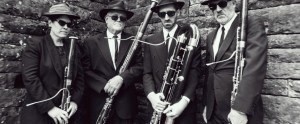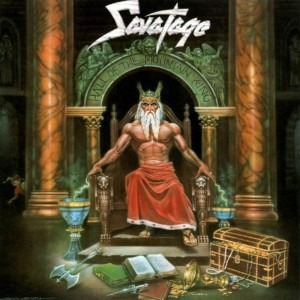
Edvard Grieg

Peer Gynt in the Hall of the Mountain King, Theodor Kittelsen, 1913 watercolour
I’m not sure we hear this irony any more – for us, the piece has become synonymous with tip-toeing down a hall in a cartoon, or part of the music for Sonic the Hedgehog. When Smurfs are in danger, we hear the Mountain King.
Grieg: Peer Gynt: Act II Scene 6: I Dovregubbens hall (In the Hall of the Mountain King) (Malmo Chamber Choir; Lund Kulturskolan Boys and Girls Chorus; Malmo Symphony Orchestra; Bjarte Engeset, cond.)

The 5 Browns
The piece has had numerous reworkings for different ensembles and you listen to it you hear the song differently. When you take the piece out of the hands of the orchestra, the piece changes and each artist adds a new dimension or idea to the piece.

The Bassoon Brothers
Grieg: Peer Gynt, Op. 23, Act II: I Dovregubbens hall (In the Hall of the Mountain King) (arr. J. Lenehan and M. Robertson) (Maksim, piano; Crouch End Festival Choir; Royal Philharmonic Orchestra; Julian Kershaw, cond.)
Tastefully arranged for 2 guitars:
Grieg: Peer Gynt Suite No. 1, Op. 46: IV. In the Hall of the Mountain King (arr. H. Frennesson and M. Gossell) (Progetto Avanti)
In the hands of 5 pianos:

Cover of Savatage’s Hall of the Mountain King
For 4 bassoons and a bit of jazz styling:
Grieg: Peer Gynt Suite No. 1, Op. 46: IV. In the Hall of the Mountain King (arr. M. Eubanks) (The Basson Brothers)
When the piece moves out the classical repertoire and into popular music, it changes again. That bass line is important and drives the new compositions forward:
For a rock and roll interpretation from 1967, we have The Who selling out:
For a version of this in progressive metal from 1985, we have Savatage’s Prelude to Madness from their album Hall of the Mountain King
and then, to return us to some idea of normalcy, we close with it arranged for 8-part a capella vocal ensemble all sung by one person:


